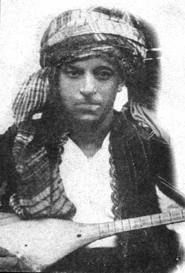Folk Poet Refik BASARAN from Ürgüp
Ürgüplü Refik Başaran was born in 1907 in the village of Taşkınpaşa (formerly Damsa), located 18 kilometers from Ürgüp. His mother was Emine Hanım, and his father was Mustafa Çavuş. It is believed that Refik Başaran developed an interest in music at the age of six or seven. Even at that young age, he would pretend to play the saz by rubbing pieces of wood against his chest and singing folk songs.
He attended a one-teacher school that opened in his village in 1915 and studied there for three years. According to his grandson, Refik Başaran began playing the bağlama when he was fifteen. His older brother, Fettah, wanted him to become a skilled musician, so he traveled to Kırşehir to buy him a saz. Later, a musician named Topal Hasan from Kavak village in Yeşilhisar, Kayseri, agreed to teach him for a fee of one gold coin per song.
Despite the financial hardships of the time, Fettah accepted this offer and ensured that Refik Başaran received proper training. Fettah had a significant influence on his younger brother's artistic development, as he was an educated man who had studied at Sineson Madrasah and served as an officer in the War of Independence. For two years, Refik Başaran walked six kilometers to his teacher’s house whenever he was free from farm work to take lessons. To further improve his saz technique, he once ran away from home and lived in a cave at the foot of Yazı Mountain for twelve days, practicing.
At the age of seventeen, he married Fatma Başaran, who shared his artistic spirit and supported his musical aspirations. Before joining the military, he played and sang at weddings, which quickly spread his fame across Central Anatolia. This growing reputation brought invitations from different regions, allowing him to travel and broaden his artistic knowledge.
Refik Başaran served as a gendarme during his military service, first in Kütahya and then in Niğde. After completing his service, he returned to Damsa and resumed playing at weddings. His original folk songs became widely known, making him a beloved musician throughout the region.
According to Gürbüz Sapmaz, Mustafa Kemal Atatürk personally gave him the surname "Başaran" after seeing his performance at a concert in Ankara, where other well-known artists such as Hacer Buluş and Safiye Ayla were also present.
One of the country’s four major record companies, "Sahibinin Sesi," invited Başaran to record a song, leading to his first record in 1935 with the song Hamit’in Türküsü (also known as Tokat Mahnesi). The record sold well, attracting offers from other companies like Odeon, Polidor, and Columbia. He recorded with all four, producing a substantial number of records.
Refik Başaran's songs often centered around themes of longing and separation. His grandson explained that his frequent trips to Istanbul for recording sessions made him homesick, which influenced the themes of his music. Between 1935 and 1947, he recorded around 200 songs. He also composed spontaneous folk songs about the events he witnessed during his travels, though many of these were never recorded and have only survived through oral tradition.
Refik Başaran passed away in 1947 in Ayaş, Ankara.




